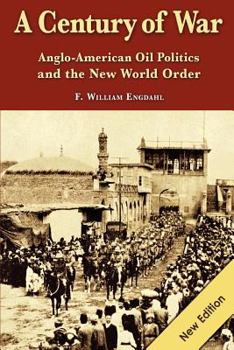A Century of War: : Anglo-American Oil Politics and the New World Order
Select Format
Select Condition 
Book Overview
"A must read for every citizen on this planet..." -- Amazon Customer
"A must read..." -- Ahmed M. Alrayes
"One of the best books i ever read." -- Abdulmuhsen S Al Meshaan
..".this clearly written book is a must read " -- Jos Ewerton
"My many thanks to Mr. Engdhal for his monumental work." -- Rugambwa Smart
"Read this book" -- K. W. Tighe
"Great book " -- Remo Williams
"Fascinating information " -- Goodview
"Excellent book." -- Gospi
"Great book..." -- Peter B.
"Five Stars " -- No Name
"Great Facts..." -- champ
This book has become an international best-seller and appears in fourteen foreign languages. It details the emergence of the United States through the control of one commodity, oil. It traces that rise from the end of the 19th century, through two world wars to the endless wars of today over oil.
Here's some of what you will learn:
+ How Churchill and the British Navy shaped the events that led to World War I and the hidden role of control of Middle East oil behind the war.
+ How the British manipulated the 1919 Mandate to control Palestine, the Balfour Declaration, Sykes-Picot and the 1919 carve up the Middle East in a manner that haunts the world to this day.
+ Why Iran's Mossadegh had to be toppled by the CIA in the 1950'S to preserve Anglo-American oil control.
+ The real reason the CIA toppled France's President de Gaulle in May 1968
+ The secret origins of the post-1973 oil shocks and the Petro-dollar to replace the gold-backed dollar.
+ The real background to the toppling of Saddam Hussein going back to the 1990s.
+ The actual hidden role for control of world oil behind the post-911 US War on Terror.
This is a story about power, power over entire nations and continents. The story describes the vehicle to that unparalleled power over nations, oil, and the vital role it has played in peace as well as wars in the past century. Henry Kissinger, the former American Secretary of State put it succinctly during the first oil shock of the early 1970's. He declared, "Control the oil and you control entire nations." A thin red line runs through the history of the world since Fashoda, and that is covered in oil and blood. This book is not for the faint of heart, but it is meant to provoke reflection and discussion among those who can see beyond the daily media manipulation of reality that is called news.





